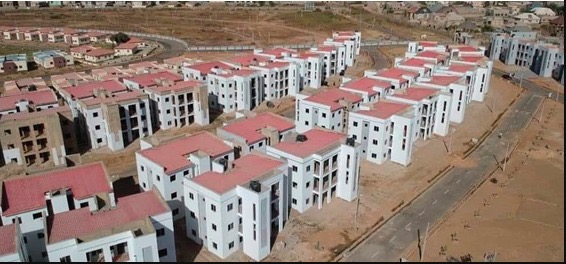Africa is on the cusp of a remarkable transformation in its real estate sector. With a rapidly urbanising population and increasing demand for affordable housing, the continent has become a hotspot for housing and urban development projects. This piece explores the dynamic world of African real estate, shedding light on prominent projects, key companies, the forces driving this growth, and the challenges and solutions that come with it.
Major Housing and Urban Development Projects
Lekki Free Zone (Nigeria): A $1.65 billion mixed-use development in Nigeria, encompassing a port, industrial park, and residential area, is poised to drive economic growth in the region.
Konza Techno City (Kenya) is a groundbreaking $60 billion smart city project near Nairobi, set to transform Kenya’s tech landscape and infrastructure.
Hope City (Ghana): a $10 billion mixed-use development near Accra, creating a modern metropolis and business hub.
Tatu City (Kenya): a $2.5 billion mixed-use development, another jewel in Kenya’s real estate crown.
Vision City (Rwanda): a $2 billion mixed-use development in Rwanda, symbolising the country’s ambitious vision for urban development.
Grand Baie La Croisette (Mauritius): a $1 billion mixed-use development on the northern coast of Mauritius, offering luxury living.
Acacias Golf City (Morocco): A $1 billion project outside Rabat, catering to Morocco’s growing urban population.
Casablanca Green City (Morocco): A $1 billion development outside Casablanca, contributing to Morocco’s sustainable urbanisation.
Pearl of Africa (Uganda): A $1 billion mixed-use development outside Kampala, showcasing Uganda’s urban aspirations.
The Waterfront (Ghana): A $1 billion development on the coast of Accra, combining luxury and leisure.
Smart City Mauritius: A $2 billion smart city near Port Louis, merging technology and urban living.
Key Players in African Real Estate
Africa Housing Finance is a pan-African housing finance institution headquartered in Nairobi, Kenya, providing financial support for housing development.
Shelter Afrique is a pan-African housing development finance institution, also based in Nairobi, Kenya, focusing on housing development funding.
Home Afrika is a Kenyan real estate development company headquartered in Nairobi, Kenya, actively involved in shaping the Kenyan real estate landscape.
Nedbank is one of South Africa’s largest banks, significantly contributing to the housing sector in Africa through lending.
Standard Bank is another South African giant that plays a pivotal role in housing sector financing across the continent.
Attijariwafa Bank is a Moroccan banking heavyweight actively supporting housing development in Africa.
Ecobank is a pan-African bank that is a vital player in housing sector financing across the continent.
The First Bank of Nigeria is a Nigerian bank with a significant role in funding housing development in Africa.
Access Bank: A Nigerian bank making substantial contributions to the African housing sector
Zenith Bank is a Nigerian bank playing a key role in financing housing projects in Africa.
GTBank is another Nigerian banking giant contributing to housing development financing in Africa.
Urbanisation: The Driving Force Behind African Real Estate
Urbanisation is the dynamic catalyst propelling the African real estate sector towards unprecedented growth. As an increasing number of people trade rural landscapes for urban opportunities, the demand for housing and urban infrastructure is reaching new heights. This urbanisation wave is not without its hurdles, including infrastructure gaps, financing complexities, and regulatory challenges.
Urbanisation stands as the vibrant heartbeat driving African real estate into an era of unprecedented growth. It’s a tale of rural landscapes giving way to urban opportunities, a narrative where the demand for housing and urban infrastructure reaches sky-high levels. This surge of urbanisation, however, isn’t without its challenges. As Africa leaps forward, it faces hurdles like infrastructure gaps, complex financing mechanisms, and regulatory puzzles. Yet, in the face of adversity, Africa’s real estate market shows resilience and adaptability as innovative solutions, strategic partnerships, and government backing unite to create an environment primed for investment.
Why should you have your sights set on African real estate? The answer is simple but powerful. The continent boasts immense growth potential, fuelled by the rapid urbanization wave and the expanding middle class. This combination makes it an alluring prospect for both local and international investors. Sustainability takes the spotlight in African housing projects, aligning with global environmental priorities. From sustainable architectural designs to eco-conscious construction methods, the African real estate sector champions environmentally friendly development practices.
In the intricate dance between banking and real estate in Africa, symbiosis is the key. Banks play a central role by providing vital financial support for real estate development. This symbiotic relationship is instrumental in fueling the growth of housing and urban projects. Tech integration is revolutionising African real estate, from seamless digital platforms for property transactions to groundbreaking construction techniques. This technological transformation is shaping the sector’s future, enhancing efficiency and accessibility. At the forefront of urban development in Africa is the concept of smart cities. These cities are designed to be technologically advanced, sustainable, and highly efficient, offering residents a marked improvement in their quality of life. For those contemplating entry into the African real estate market, a plethora of options await, encompassing residential, commercial, and mixed-use properties. This diverse landscape caters to investors with a range of objectives, making it a versatile market brimming with opportunities. Bridging the affordable housing gap emerges as a top priority within African real estate. Ambitious initiatives are underway aimed at providing decent and affordable housing to the masses. In summary, the African real estate sector is on an exhilarating journey, fuelled by visionary projects, robust financial institutions, and a burgeoning urban population, and it’s poised to sculpt the continent’s urban future for generations to come.
Africa’s real estate sector is a dynamic, ever-evolving landscape. With visionary projects, supportive financial institutions, and a growing urban population, it is poised to shape the continent’s urban future for generations to come.


